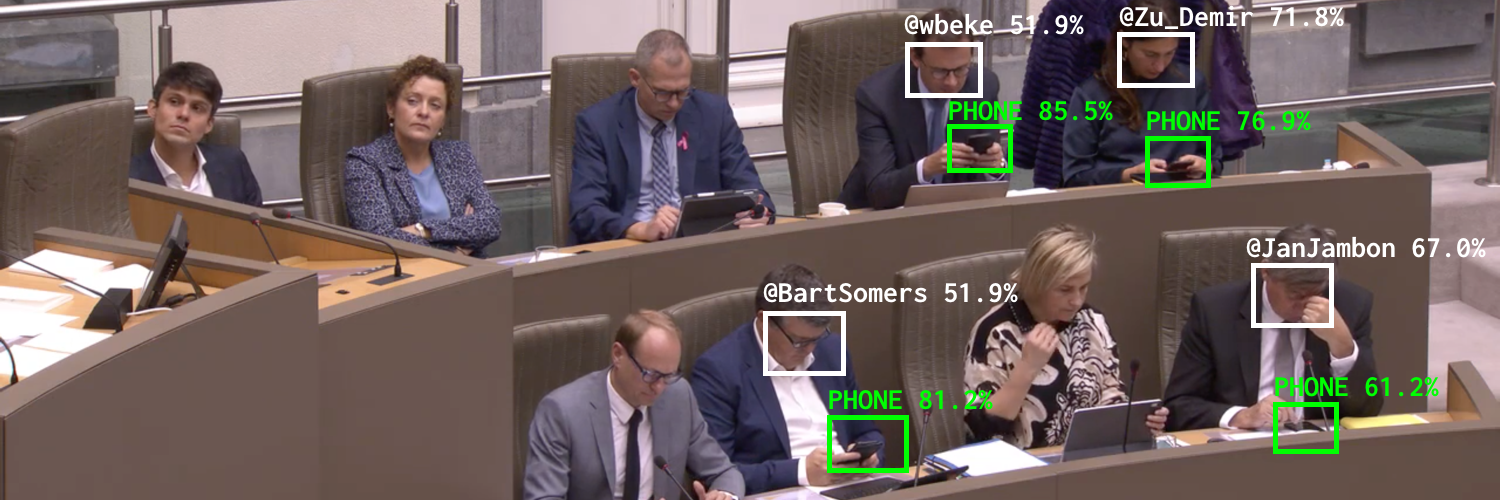Politicians are hereby busted for using their cell phones during sessions, thanks to software written by Belgium artist Dries Depoorter. His artificial intelligence program “The Flemish Scrollers” reviews YouTube live streams of Flemish government meetings and identifies who’s on their phone along with their face and Twitter handle. It then tweets clips for our amusement, heh heh.
Dear distracted @BartSomers , pls stay focused! pic.twitter.com/XGbaJgEVS6
— The Flemish Scrollers (@FlemishScroller) July 5, 2021
Depoorter tells Gizmodo that he plans to make the code open source for, say, inquiring minds in the U.S. to review C-Span’s bounty of material, and one can only imagine the applications across the aisle on the United States Senate and House floors. No more Candy Crush silent protests. No more Matt Gaetz sharing nudes. No more Ted Cruz sullenly giving Klobuchar the cold shoulder or noodling around during Senate testimony about the Capitol riot. (At least, in a fanciful world in which Ted Crus responds to shame.)

Unfortunately, Depoorter told Gizmodo, it’s impossible to award politicians an overall phone use-to-session time ratio due to shifting camera angles, which instills a rare, deep desire for more surveillance.
The project provides an entertaining public service, but Depoorter told Gizmodo that he’s hoping to show the dangers of face recognition technology. The project bears a strong resemblance to Amazon’s Rekognition program, which has a nearly 35% error rate for darker-skinned women. It recalls countless hair-raising police misuses to misidentify suspects and pick out protesters with warrants, potentially culling footage from their cell phones, street-facing doorbells, social media posts, and panoptic indoor and outdoor surveillance cameras. Our scant knowledge often comes from records requests and personal testimonials, partly because it’s easy enough for cops to plausibly deny that face recognition was the method used to identify a target.
The ACLU has pointed out that programs like these could also endanger domestic abuse survivors, Alcoholics Anonymous participants, sex workers, worshippers, and undocumented immigrants. They’ve filed a joint lawsuit against Clearview AI with the nonprofit social services organisation Mujeres, which supports Latinx women; the organisation warns that people would fear going to their offices, and undocumented immigrants and domestic abuse survivors are less likely to bring suits themselves.
Depoorter has made the point in a long string of such projects, including installing a camera that announces what it sees, picking out celebrities from CCTV feeds, and allowing participants to report jaywalkers to the police in real-time and then purchase the mementos.
Targeting politicians and then shame-tweeting the proof could help curb devastating consequences by motivating lawmakers to act. States and cities have been creating their own restrictions on facial recognition, but so far only seven states have laws on the books. (This is why most major face recognition lawsuits go to Illinois, on behalf of Illinois residents.) The ACLU has called on President Biden to prohibit the use of federal funds to pay for unfettered and flawed face identification systems.
Flemings, you can tell your representatives to do their jobs on the Flemish Scrollers Twitter feed.
